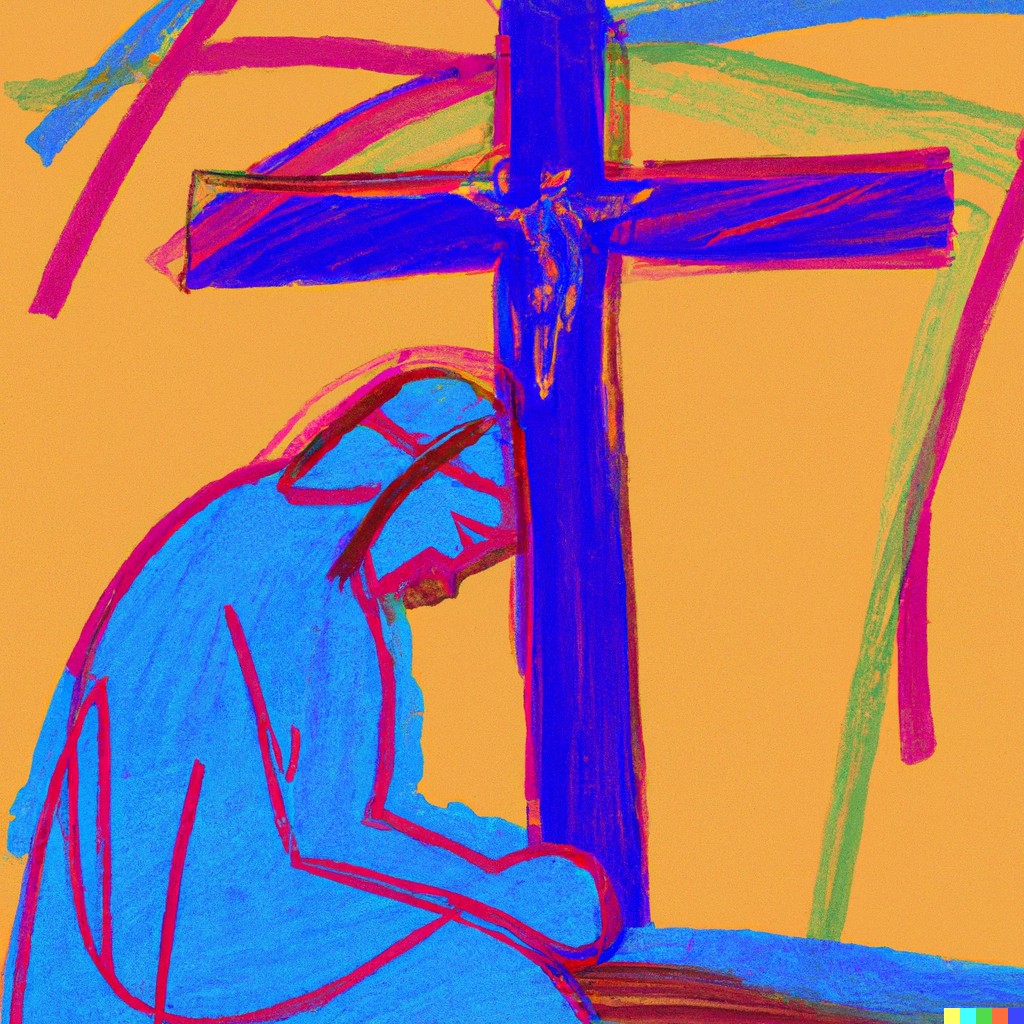Christian Art | Faith In Jesus Christ | Believe The Crucifixion Of Jesus
Office Of Readings | Week 20, Monday, Ordinary Time | A Reading From The Commentary Of Pope Saint Gregory The Great On The Book Of Job | Fights Without And Fear Within
‘A war of troubles: fighting within and fighting without.’
Pope Saint Gregory the Great’s reflection on Job situates the Christian life within a dual struggle: the battle against opposition from without and the struggle against weakness within. Drawing on the image of a soldier, he describes the saint as constantly engaged in warfare, not of worldly conquest but of endurance and teaching. Patience functions as a shield against external aggression, while doctrine becomes the weapon to counter the subtler dangers of persuasion and error.
The imagery recalls the Apostle Paul, who himself catalogued the dangers he faced — both physical threats such as rivers, brigands, and imprisonment, and spiritual concerns arising from the fragility of the communities under his care. Gregory highlights Paul’s extraordinary balance: even while enduring physical hardship, he maintained a constant pastoral vigilance, anxious for the perseverance of the churches. This dual responsibility, to withstand persecution and to preserve others from discouragement, exemplifies the vocation of the apostle and, by extension, of the Church’s ministers.
Gregory also emphasises the paradoxical compassion of the righteous. Far from being consumed by their own suffering, they focus instead on the needs of others. Paul’s concern was not that his chains might weaken him, but that his disciples might falter upon seeing his afflictions. His writings reassure them that such trials are inevitable, thereby transforming his sufferings into a source of encouragement rather than scandal. In this way, his personal endurance becomes a form of teaching, embodying the very doctrine he proclaimed.
The closing image is that of the physician who, though afflicted by illness, still tends to his patients. This metaphor captures the distinctive character of Christian leadership: weakness and suffering do not disqualify the teacher but deepen his compassion. For Gregory, the saint’s ability to carry his own burdens while healing others reflects the pattern of Christ himself, who bore the cross while bringing salvation to humanity.
The reflection thus provides a theological lens through which to interpret suffering: not as a purely private trial, but as a moment of witness and service. The faithful are reminded that their endurance, joined with compassion, strengthens the wider body of the Church.

A Reading From The Commentary Of Pope Saint Gregory The Great On The Book Of Job | Fights Without And Fear Within
The saints are caught up in a turbulent war of troubles, attacked at the same time by force and by persuasion. Patience is their shield against force, and doctrine makes the arrows that they shoot against persuasion.
See the skill with which they prepare themselves for both fights. The perversity within, they straighten out and teach and correct. The adversity without, they face and endure and suppress. They despise the enemies that come from outside to attack them, they resist them and stop them from subverting others. But to the weak and feeble citizens within they give compassion, afraid that they might otherwise lose the life of righteousness completely.
Let us look at St Paul, the soldier of God’s army, as he fights both enemies: as he says, quarrels outside, misgivings inside. He lists the enemies he has to resist: danger from rivers and danger from brigands, danger from my own people and danger from pagans, danger in the towns and danger in the open country, danger at sea and danger from so-called brothers. He lists the weapons he fires against them: I have worked and laboured, often without sleep; I have been hungry and thirsty and often starving; I have been in the cold without clothes.
In the middle of all these battles the army’s camp must still be patrolled and safeguarded: and, to leave out much more, there is my daily preoccupation: my anxiety for all the churches. You see how bravely he takes the war upon himself and how compassionately he devotes himself to keeping his neighbours safe. First he lists the evils he suffers, then he lists the good things he is giving.
Let us ponder what a burden it is to endure attacks from outside and at the same time to give protection to the weak inside. From without, he suffers attack: he is beaten, he is chained. From within, he endures fear: the fear that his sufferings might discourage not him, but his disciples. So he writes to them: Let no-one be unsettled by the present troubles: as you know, they are bound to come our way. In the middle of his own sufferings, it was the downfall of others that he feared: if they saw him being beaten because of his faith, they might hold back from professing that faith themselves.
What an immense love he has within him! He neglects what he himself is suffering and worries only that his disciples might suffer temptation because of it. He thinks nothing of the wounds of his body and he heals the wounds of other people’s hearts.
This is something characteristic of the righteous. Just because they suffer pain themselves it does not stop them caring for the needs of others. They grieve for themselves and the adversity they face but they still give the needed teaching to others. They are like some great doctor who is struck down by sickness: they endure their own wounds while giving healing medicines to their patients.
Christian Prayer With Jesus Christ
Almighty God,
you strengthened your servant Paul
to endure hardship without losing sight of his flock.
Grant us patience in adversity
and compassion in our dealings with others,
that in our weakness your power may be revealed
and your Church may be preserved in faith.
Through Christ our Lord.
Amen.
Glossary Of Christian Terms
Gregory the Great (c. 540–604) – Pope and Doctor of the Church, noted for his writings on pastoral care, moral theology, and liturgy.
Moral Reflections on Job – Gregory’s extended commentary on the Book of Job, using Job’s sufferings as a framework to explore Christian morality and the life of the Church.
Patience – The spiritual virtue of enduring trials without bitterness, central to Gregory’s understanding of the Christian battle.
Doctrine – The teaching of the Church, understood as both guidance and a safeguard against error.
St Paul – Apostle of the Gentiles, whose missionary journeys and epistles form a significant part of the New Testament.
Quarrels outside, misgivings inside – Paul’s description (2 Corinthians 7:5) of the dual challenges of external opposition and internal anxiety.
Churches – The Christian communities founded by Paul and other apostles, whose perseverance in faith was a continual concern.
Chains – A reference to Paul’s frequent imprisonments for the sake of the Gospel.
Temptation – The trial of faith which may lead believers to falter or abandon their commitment to Christ.
Physician metaphor – A classical and biblical image of the spiritual leader as one who heals souls, even when personally afflicted.








